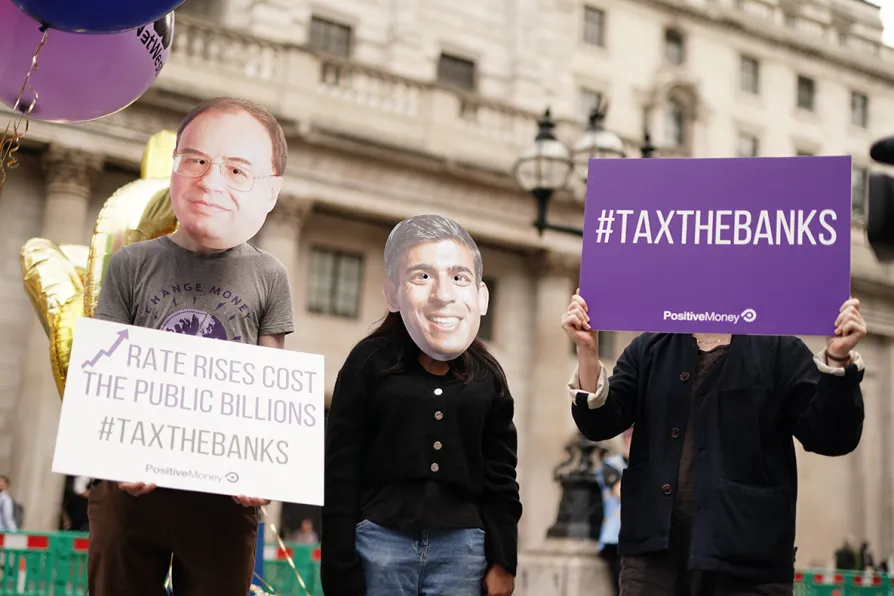
 Campaigners from Positive Money demonstrate outside the Bank of England in London, against the rises in interest rates amid the cost of living crisis. They are demanding the government introduce a windfall tax on bank profits, August 3, 2023
Campaigners from Positive Money demonstrate outside the Bank of England in London, against the rises in interest rates amid the cost of living crisis. They are demanding the government introduce a windfall tax on bank profits, August 3, 2023
A LOOK through the motions on the TUC’s agenda paints a picture of a country deep in crisis.
We’ve seen a sustained decline in living standards for 15 years as pay has fallen in value year after year. A decline that runaway inflation has turned into a catastrophe for millions.
We work in an economy and environment wrecked by corporate abuse.
Giant energy firms stack up record profits as bills go through the roof. For all their greenwashing rhetoric, firms like BP and Shell invest almost nothing in renewables, focusing on seeking new sources of oil and gas — and why not? For private companies a scorched plant will never trump short-term profits.
In that warming planet water becomes an ever-more precious resource. Yet England is the only major European country to have handed it too to private companies — many owned abroad.
Even capital’s in-house paper the Financial Times admits the results.
A sector debt-free when privatised has amassed £60 billion in debt since, while paying out over £70bn in dividends and hiking bills 40 per cent. What these crooks haven’t done is maintain the infrastructure they took responsibility for.
Pipes leak a fifth of the water they carry. Groundwater and rivers are being tapped at unsustainable levels, while companies pump raw sewage into waterways hundreds of thousands of times a year.
Services are on their knees. NHS waiting lists exceed seven million, as hospitals struggle with chronic staffing shortages. A parasitical private sector leeches money out.
Hundreds of schools are literally crumbling. Like nurses, teachers have lost almost a quarter of their pay in real terms since 2010.
Local government struggles to deliver the bascis after years of savage cuts. The country’s biggest council is bankrupt. Hundreds of libraries and swimming pools have shut down.
All these trends were visible before the pandemic — yet it massively accelerated them.
What initially seemed an opportunity to build a new, more respectful society in which everyone was valued — clapping for carers, celebrating key workers — has proved anything but.
A corrupt ruling elite was exposed awarding lucrative contracts to family and friends while ignoring the rules imposed on others. Key workers have been kicked in the teeth, their pay forced down, their sacrifices dismissed.
Inflation is now being used to erode pay and boost profits, with the Bank of England repeatedly hiking rates to drive up household costs in a bid to quash “demand” for such essentials as housing, heating and food.
We’ve emerged a more bitter, angrier society. Verbal and physical assaults on shop workers have doubled on pre-pandemic levels.
Over the past year, unions have led a significant fightback against these trends. But we need a movement for a real overhaul of a society failing the majority on every front.
Such a movement existed from 2015-20. A socialist-led Labour Party was popular, winning Labour its biggest increase in vote share for 70 years in 2017.
Its reforming manifestos were supported by trade unions, whose concerns and policies were reflected in them.
That movement failed. It was crushingly defeated in 2020, and it will not come back in the same form.
But unions, now they are on the offensive again, should not be satisfied with a political offer so inferior to that of 2015-20, one which leaves the structures of Britain’s rigged economy untouched.
The defeat of the last great socialist project should not be used to limit our ambitions. Instead we need new strategies to impose the changes we need on a financially engorged but politically bankrupt ruling class.
Unions have many of the policies needed, from Unite’s fully costed plans to renationalise energy to the calls for investment in a modern, safe and properly staffed railway.
A key question before delegates will be how we mobilise workers and communities to force these policies onto the political agenda.














